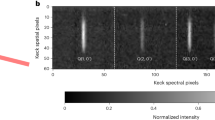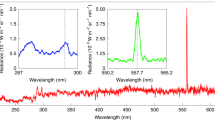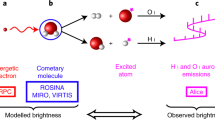Abstract
PROF. L. VEGARD1 has recently reported the observation of two infra-red lines or band-heads in the auroral spectrum, namely,Pointing out that, since the spectrum shows bands of the N2 second positive system strongly, it might also be expected to contain bands of the N2 first positive system, Prof. Vegard calculates the positions of three bands of the latter which are within a few Angstrom units of the stronger auroral line λ7883, and points out that one of the three corresponds to an improbable transition, but leaves open the question as between the other two.
This is a preview of subscription content, access via your institution
Access options
Subscribe to this journal
Receive 51 print issues and online access
$199.00 per year
only $3.90 per issue
Buy this article
- Purchase on Springer Link
- Instant access to full article PDF
Prices may be subject to local taxes which are calculated during checkout
Similar content being viewed by others
References
NATURE, 129, 468; March 26, 1932.
Phys. Rev., 30, 812;1927.
Phys. Rev., 23, 294; 1924: and N.R.C. Bulletin, No. 57.
"Int. Crit. Tables.", 5, 415; 1929.
Comptes rendus, 150, 860; 1910.
Trans. Roy. Soc. Canada, 19, 39; 1925.
Author information
Authors and Affiliations
Rights and permissions
About this article
Cite this article
JEVONS, W. The Auroral Spectrum in the Infra-Red. Nature 129, 759–760 (1932). https://doi.org/10.1038/129759a0
Issue Date:
DOI: https://doi.org/10.1038/129759a0
This article is cited by
-
Infra-Red Bands in the Aurora
Nature (1932)
Comments
By submitting a comment you agree to abide by our Terms and Community Guidelines. If you find something abusive or that does not comply with our terms or guidelines please flag it as inappropriate.



